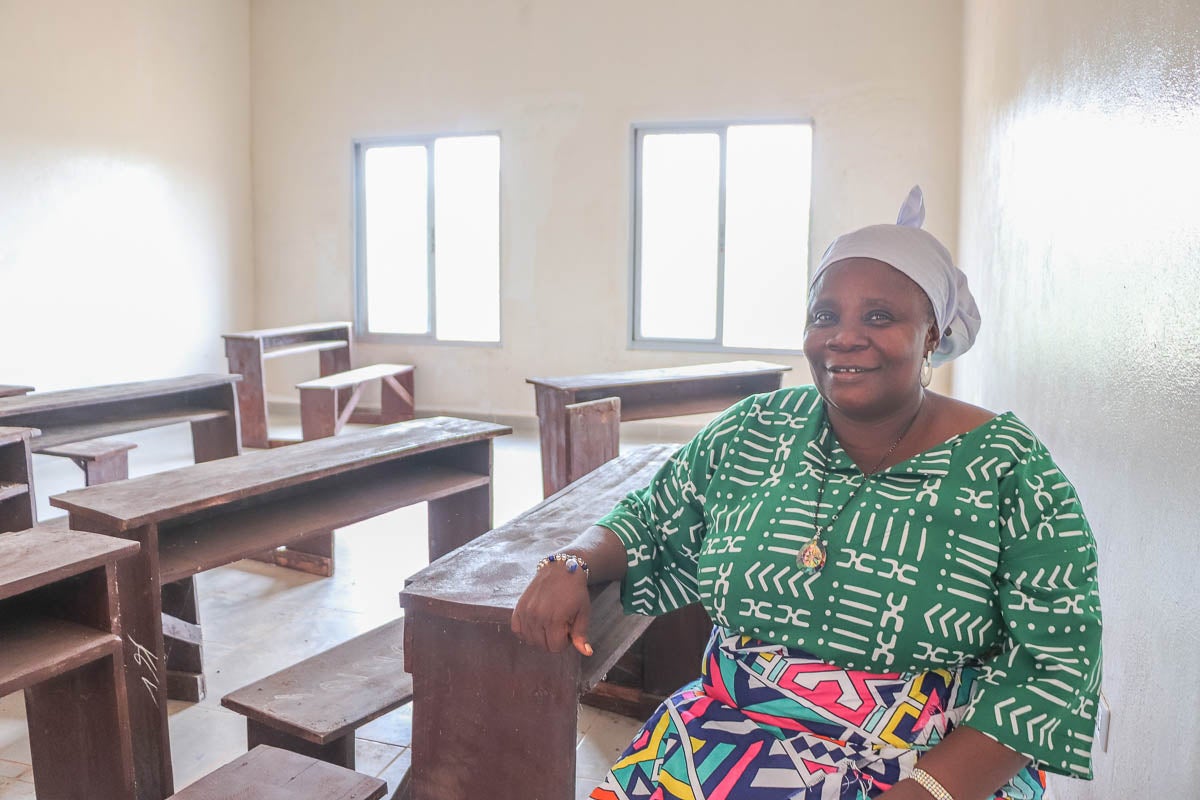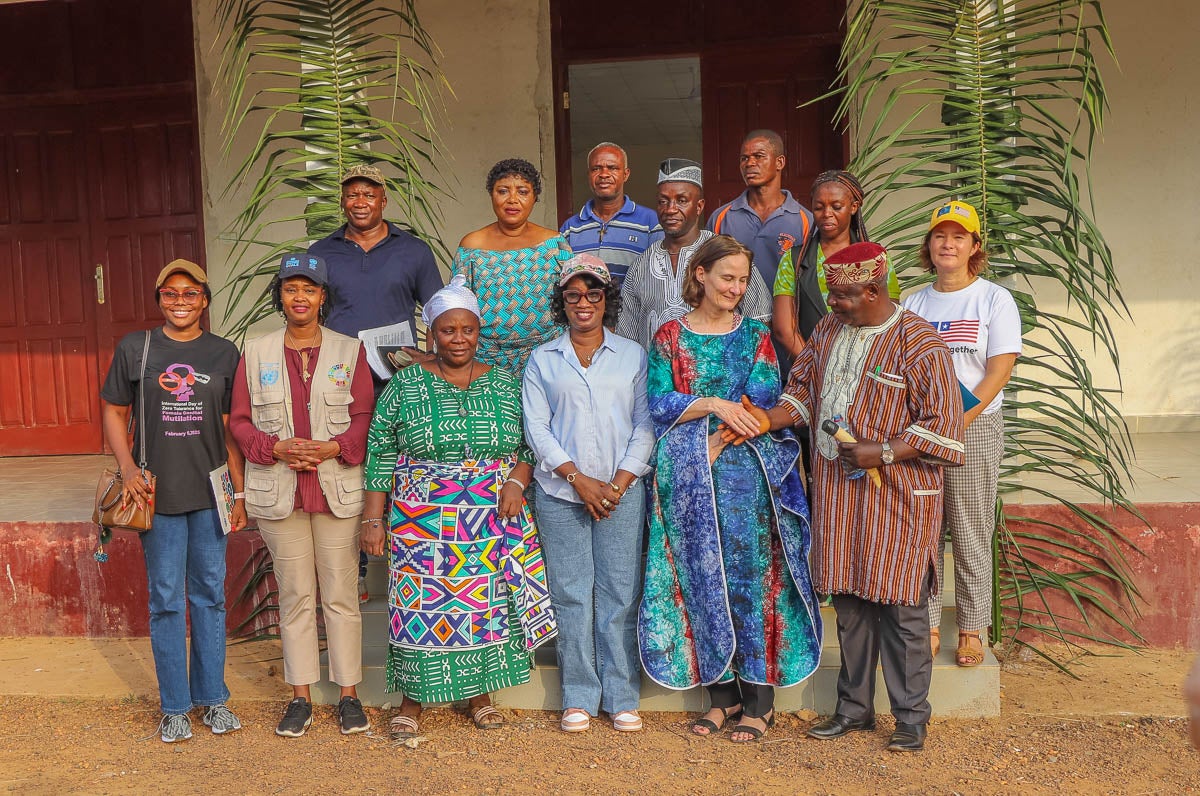From Tradition to Transformation: The Sonkay Town Vocational and Heritage Center
Date:

"It was not easy at the beginning, when I opened the school by myself," recalls Massa Kandakai, her voice carrying the weight of her journey. "But I know it was worth it. I saw the need for change in our community, and someone had to take the first step."
In the heart of Todee District in a rural part of Liberia, a remarkable transformation is taking place. Massa Kandakai, once a practitioner of Female Genital Mutilation (FGM), has become a pioneer for change in her community. Her journey from traditional practices to becoming an advocate for alternative livelihoods exemplifies the power of education and economic empowerment in creating sustainable cultural shifts.
A Leader's Journey
Massa Kandakai's decision to abandon FGM practices didn't come easily in a country where the procedure affects 38.2% of women aged 15-49. As a respected Zoe (traditional leader), her choice to establish a school in Sonkay Town represented a significant departure from deeply entrenched cultural norms.
"When we first introduced this initiative, many women in the surrounding villages were hesitant to participate," Kandakai recalled during a recent visit by international dignitaries. "However, as they learned new skills, gained financial independence, and saw the positive changes in their lives, their perception shifted."
Today, that school has evolved into the Sonkay Town Vocational and Heritage Center (VHC), a facility that offers alternative livelihoods for former FGM practitioners, education for at-risk girls, and alternative cultural heritage preservation for surrounding communities. Currently, 94 children—mostly girls—are enrolled in the school, receiving an education that might otherwise have been inaccessible to them.
A Center for Change
The Sonkay Town VHC stands as one of four centers funded by the EU/UN Spotlight Initiative to serve as a center of learning and cultural exchange to replace bush schools where FGM was practiced. Constructed between 2020 and 2023 on 35 acres of land, the center serves approximately 400 traditional zoes who were previously involved in FGM, as well as around 1,500 young women and girls from Montserrado County.
The center comprises five structures: a multi-purpose hall, a dining hall with kitchen, a six-room training facility including a teacher lounge, an office for the facility's administrator, and a solar panel storage room. But more than its physical infrastructure, the center represents a fundamental shift in cultural practices.
During the implementation of the Spotlight Initiative, 127 bush schools were officially closed in Montserrado County following a full ban on FGM. This progress builds on years of engagement with traditional leaders and the Government of Liberia, which led to policy statements in 2019 and 2022 temporarily suspending the practice, culminating in a nationwide ban proclaimed by Chief Zanzan Karwor, former National Chairperson of the Council of Chiefs and Elders of Liberia, on February 6, 2023.
"Today, the women are not only earning income but also saving and investing in their families' futures," Kandakai explained. "Some of them have even been able to purchase homes for the first time, a milestone that was once unimaginable. Economic empowerment does not benefit only women; it strengthens entire households and communities."
International Recognition and Support

On March 1, 2025, Erica Gerretsen, Director for Human Development, Migration, Governance & Peace at DG INTPA, European Commission, visited the center alongside representatives from the Government of Liberia, the European Union in Liberia, and the UN in Liberia, including RCO Christine N. Umutoni and UN Women Liberia Country Representative, Comfort Lamptey.
"Since 2016, the European Union, in partnership with the United Nations, has been committed to addressing the issue of Female Genital Mutilation in Liberia through the Spotlight Initiative," Gerretsen noted during her visit. "Standing here today and witnessing the tangible results of this work is both humbling and inspiring."
She emphasized the significance of the progress made while acknowledging the challenges ahead: "Liberia has made significant strides in combating FGM, including the signing of a national ban on the practice. However, despite this progress, much remains to be done. The work being carried out at the Sonkay Town Vocational and Heritage Center is proof that change is possible."
Liberia's Minister of Gender, Hon. Gbeme Horace-Kollie, who also visited the center, shared similar sentiments: "When we assess the success of a project, we must ask: how has it impacted the lives of those it was designed for? Listening to the testimonies of former FGM practitioners today, hearing how they have been able to rebuild their lives and secure sustainable livelihoods, reaffirms the importance of this initiative."
She particularly highlighted Kandakai's leadership: "The Chief Zoe's leadership in establishing this school is particularly inspiring. The transformation of this community is remarkable, and I am immensely proud of what has been achieved. This center stands as an example of how we can empower women and girls by providing them with viable alternatives that preserve cultural heritage while eliminating harm."
Looking Forward: Spotlight 2.0
The momentum generated by the Sonkay Town VHC and similar initiatives is set to continue with the launch of Spotlight 2.0. On March 4th, Erica Gerretsen joined Liberia's Minister of Planning and Development Planning, Augustine Kpehe Ngafuan, to sign the financing agreements for the Spotlight 2.0 Initiative and the Support Measures of the European Union's Annual Action Plan 2024.
This significant step forward ensures that gender equality and sustainable development will continue to be priorities in Liberia. The signing ceremony was attended by the Minister of Gender, Hon. Gbeme Horace-Kollie, UN Resident Coordinator Christine N. Umutoni, representatives from the UN system, and other Government officials.
Under Spotlight Initiative 2.0, priority will be given to empowering grassroots women who survive gender-based violence and those transitioning away from FGM. The initiative will provide vocational training in fields like hospitality, beauty services, soap making, weaving, tie-dyeing, climate-smart agriculture, and IT skills. Additional financial literacy programs will equip participants with essential business management skills, encouraging them to join VSLAs for solidarity and growth.
Economic empowerment activities will be conducted with local organizations to foster entrepreneurship, and young women will be connected to TVET schools, ensuring that the skills they gain translate into sustainable livelihoods.
A Vision for the Future
When asked about her hopes for the future, Massa Kandakai's answer was both practical and visionary: she wants a car. Not as a status symbol, but as a tool for expanding the center's impact—so she and the other women could learn to drive and then travel to other communities, reaching even more women to empower them.
As Gerretsen observed during her visit, "The Zoes of Sonkay Town should be recognized as role models for change. This center, alive with learning and economic empowerment, is a beacon of hope for the future."
In the story of Massa Kandakai and the Sonkay Town Vocational and Heritage Center, we find a powerful testament to the possibility of preserving cultural identity while abandoning harmful practices, and to the transformative potential of education and economic empowerment in creating sustainable, community-led change.